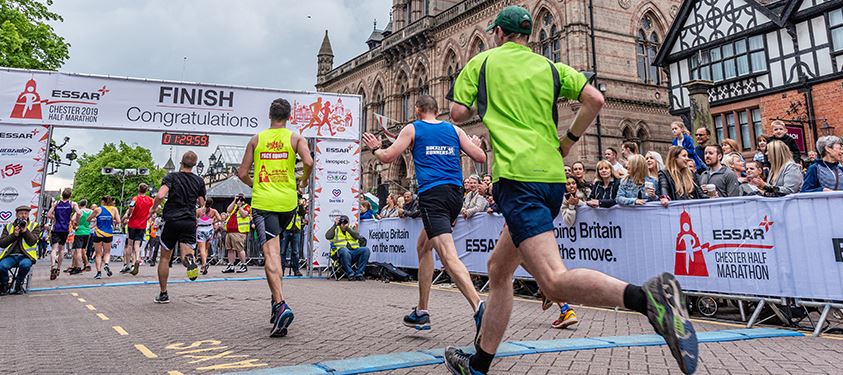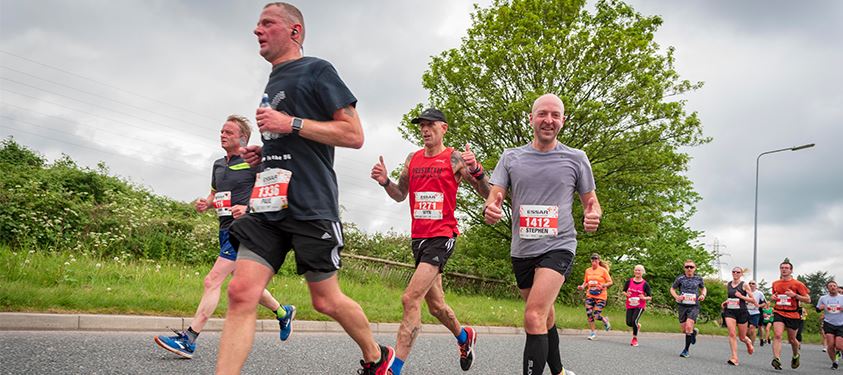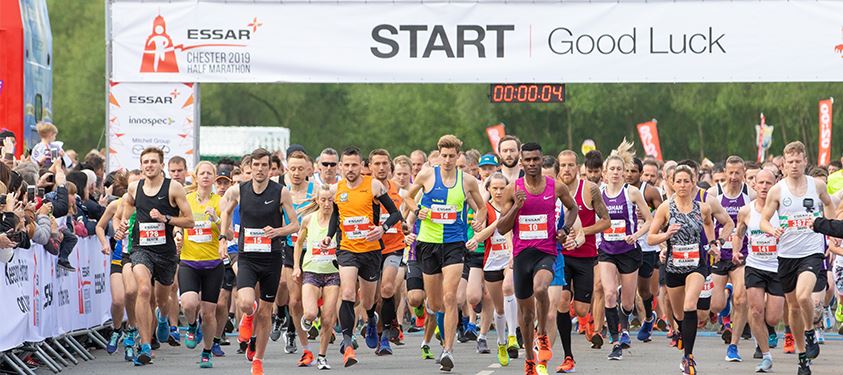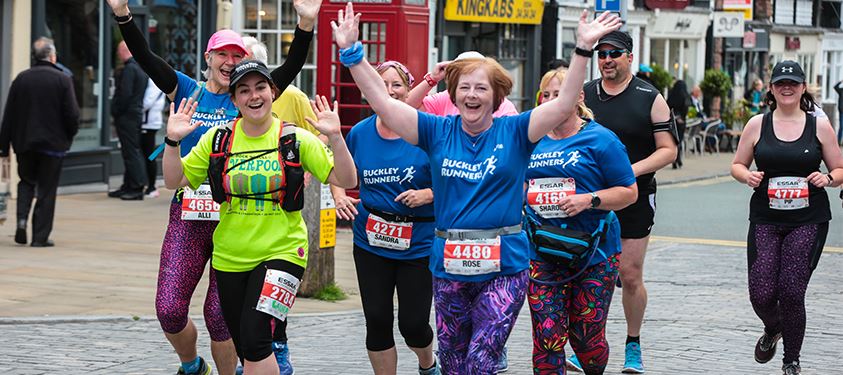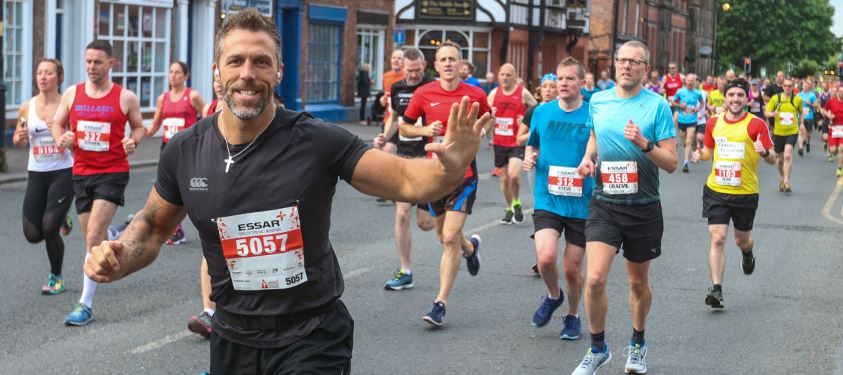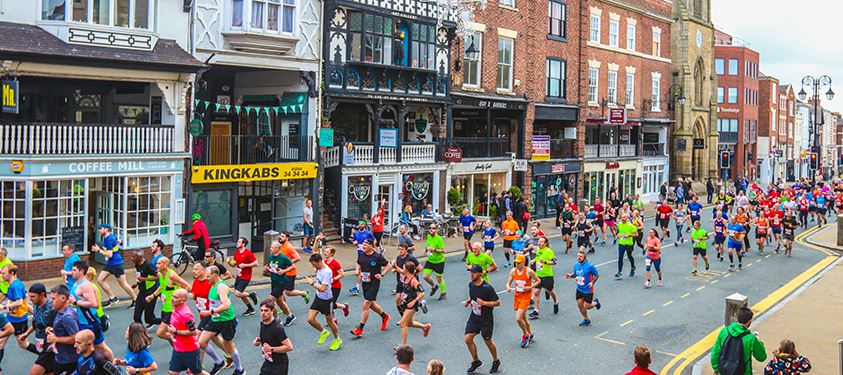Nutrition - Getting your nutrition right for a half marathon by our Race Sponsor HIGH5 Sports Nutrition
Training for a half marathon takes a triangular approach: training, recovery and nutrition. Good nutrition is key to balancing this performance triangle as our body needs the right balance of nutrients in order to train hard and recover faster. Poor nutrition leads to slow or non-existent progressions and your body will be more at risk of colds, infections and injury.
We've been chatting to our friends at Runningwithus to get the best tips and tricks to be well fuelled for your next half marathon.

Quality diet with good variety
Allow time to plan and eat structured healthy meals. More often than not we tend to snack on unhealthy foods when we haven't planned or prepped and we are getting it 'on the fly'. Doing a weekly shop and planning your meals can be a really good use of time.
Avoid the temptation to exclude whole food groups from your diet
There is little to no evidence that this promotes sustainable healthy lifestyles. If you are looking to lose weight whilst building up your training take care to ensure you are still remaining healthy. In order to train and recover your body needs fat, protein and yes, carbohydrate!

No single food can maintain and promote good health and the term 'superfood' should always be treated cautiously. However, foods rich in vitamins and minerals will give you most benefit in your diet. Berries, nuts, seeds, pulses, quinoa and plenty of mixed coloured fruit and veg. In particular foods such as blueberries, beetroot, avocado, quinoa, kiwifruit, broccoli and oily fish can be great additions.
It is important not to exclude whole food groups to ensure your body is getting the vitamins and minerals it needs to function normally. Exercising regularly and to high intensities can put your immune system under pressure. HIGH5 Sports Vitamins have been specifically formulated with active people in mind and are filled with 20 active ingredients and vitamins you need to maintain your immune system during and after intense physical exercise.
Eat wholesome wholegrain carbohydrate
Sources such as rye bread, sweet potatoes and buckwheat offer a more sustained energy source. Try and avoid excessively large portions of ‘refined carbohydrate’ such as cakes and sugary cereals as these offer a lot of calories but relatively limited density of vitamins or minerals and their energy is often short lived.
Protein is key
It's important to eat a good variety of protein sources daily, such as lean meat, pulses and dairy. The timing of protein intake is a key factor as our body doesn't store protein like it does carbohydrate and fat. Breakfast time is a good example – following a night of sleep without food your body will be needing protein. Try to include this in your breakfast (for example from yoghurt, or eggs) and then try to have a steady intake of quality protein throughout the day.
Include healthy fats on a daily basis such as eggs, nuts, oily fish and avocados and try to reduce trans- fatty acid intake e.g. chocolate bars & biscuits etc.
Stay hydrated
Carry a bottle of water everywhere you go and ensure you keep filling it up aiming for at least 2 litres a day. Add some flavour and key electrolytes your water by adding a rehydration electrolyte tablet to your water. With magnesium, HIGH5 ZERO helps you keep a normal electrolyte balance. Take this as part of your cramp prevention strategy and to keep your body in balance.

Meal timing is especially important for athletes
Your pre-training meal should contain foods that are high in carbohydrate, low in fat, moderate amounts protein, low in simple sugars and concentrated fibre. Generally, the meal should be consumed far enough in advance to allow for stomach emptying and intestinal absorption.
A good rule of thumb is to limit your pre-run meal to about 300-400 calories eaten approx. 3-4 hours before training. A smaller 200-calorie meal such as a wholemeal bagel or oatcakes with banana would be eaten between 1 and 2 hours before running.
If you plan on running in the evening, plan your food intake accordingly to allow for a healthy mid-morning and mid afternoon snack. this could include wholegrain rice cakes with a nut butter, handful of dried mango or a banana to ensure you’ve got enough energy to fuel your run. However try not to overeat during the day as this will leave you feeling lethargic, sluggish and may cause stomach issues whilst running later on.
Good balanced food planning will ensure you arrive at your run raring to go!
What to eat after training?
Your post-run meal is super important because when you have finished your muscles have depleted their energy stores. The energy stores need to be replenished as soon as possible for your training to be of maximum benefit. Therefore, it is important to consume something quickly digestible such as a HIGH5 Recovery Drink or a healthy sandwich containing protein, as soon as you can after training.
What to eat on race day?
Race day is all about having a plan you have practised in training and sticking with what you know works.
Aim to eat a good breakfast 2-3 hours before the start of your race, aim to eat slowly as nerves can lead many to eat breakfast too quickly and upset their digestion.
Snack on half an Energy Bar or banana perhaps 60-75 minutes before the race start and make sure to keep a bottle filled with Energy Drink near to top up.

During the race particularly a half marathon where you think you will be running for longer than two hours, fuelling throughout the race can help you sustain your energy and pace towards the end. Energy Gels are the easiest and most effective way to get this energy quickly and easily into your system. One gel after 45-60 minutes and one every 30-40 minutes after, it's not a shot though, sip it, don't down it and you'll find it is easier to digest.
Sip on water throughout the race but try not to overdo it, we don't need to be drinking gallons of water. Go in well hydrated and then sip every few kilometres to keep topped up.
What to eat after the race?
Finishing the race is all about recovery and making sure you take on both carbs, to replenish your muscle glycogen stores, and protein, to rebuild your muscles. Keep a Recovery Drink sachet in your bag ready for the end and eat a balanced meal 1-2 hour later.
Click here for a more detailed nutrition guide for a half marathon
Good Luck!
Race Record
Men
1:02:21
Vincent Boit in 2015
Women
1:14:32
Amanda Crook in 2013
Never miss our training runs or special offers!
2024 Results
Men
| 1st | Marshall Smith (Ashford AC) | 1:07:52 |
| 2nd | Chris Perry (Vale Royal AC) | 1:08:02 |
| 3rd | Jack Bromley (Buckley RC) | 1:10:10 |
Women
| 1st | Abigail Howarth (Vale Royal AC) | 1:19:17 |
| 2nd | Abbey van Dijk (Run 4 U & Perform RC) | 1:19:46 |
| 3rd | Sarah Hunter (Ackworth Road Runners) | 1:20:19 |

